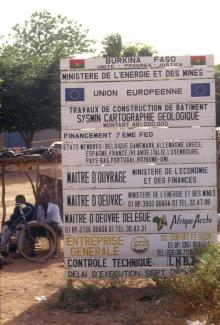Aid Effectiveness
TruBudget and the Paris Declaration

All countries agreed that in future, the administration of official development assistance (ODA) should be aligned to the systems of partner countries (see Peter Lanzet in D+C/E+Z e-Paper 2017/02, Tribune). The funding would preferably be delivered through partners’ national budgets. Budget support became the method of choice for cooperation, including in German development policy.
The Paris Declaration was revisited in 2009 in Accra and in 2011 in Busan. The results were sobering: only one of its 13 goals were reached. Slight improvements could only be detected, if anywhere, on the side of developing countries. The failure of the Paris Declaration was so obvious that most donor governments abandoned the idea of budget support and returned to good old project financing.
The Paris Declaration died a slow death, so to speak, and a resurrection is nowhere in sight. Nowadays, the donor community is in the same position as it was 15 years ago: funding continues to be extremely inefficient. It is hardly aligned to developing countries’ systems and typically bypasses their national budgets. For recipients, the world of financing has become even more complex and confusing.
According to the OECD, more than 500 different donor organisations currently offer assistance worldwide. In Burkina Faso, 81 bi- and multilateral agencies are active. Each one has its own requirements, defines its own conditions and pursues its own goals. Burkina Faso must cope with all of the related demands. As a result, its ministries host over 300 different project teams. Acting on the initiative of the donors, these teams sometimes work at cross purposes in the same regions and sectors.
Therefore it is unsurprising that a 2017 report by the Burkinabe government found that, at 63 %, the financial absorption of externally financed projects was significantly lower than that of nationally financed projects (96 %). The cause was generally understood to be the difficulty of planning and managing the diverse contracts and allocation processes of the donors.
Most donors do not deliver aid through national budgets because they fear losing control and misappropriations. Therefore, governments of developing countries often do not know how much money has actually been spent on public investments. Typically, service providers who work on behalf of developing countries are paid directly by donors. In countries with a significant portion of externally-financed investments, this model has a negative impact on sustainability. All too often, important project do not figure in the national budget at all due to the parallel streams of donor funding. Without precise information on revenues and expenditures, however, every attempt at budgetary planning will just be a waste of paper.
But why was not more progress made after the Paris Declaration? The answer is that budget support did not meet high expectations. Alongside political overload, a lack of governance on the part of many developing countries mattered. Scandals like Malawi’s so-called “cashgate” had a long-term impact on the this aid modality’s credibility. After all, some $ 32 million were misappropriated. That was possible thanks to an abuse of this very electronic system that had been installed to improve public financial management.
Up until now, there was no way to curb the risk of financial mismanagement. New technologies like blockchain or artificial intelligence make a difference however. They can make long-standing problems suddenly look surmountable. However, they have not been used much in development cooperation so far.
Blockchain is a perfect way to make processes transparent, traceable and secure. That is why KfW came up with the idea to tap its potential and develop the TruBudget application (see main essay). TruBudget makes it possible to manage the use of donor funds in a transparent, secure and traceable way.
(pk)







